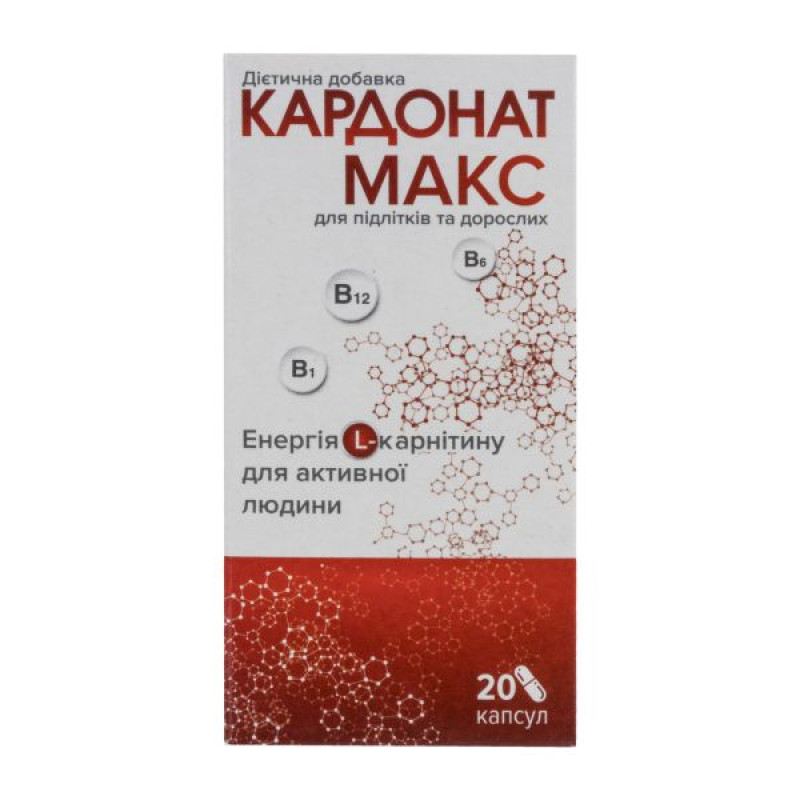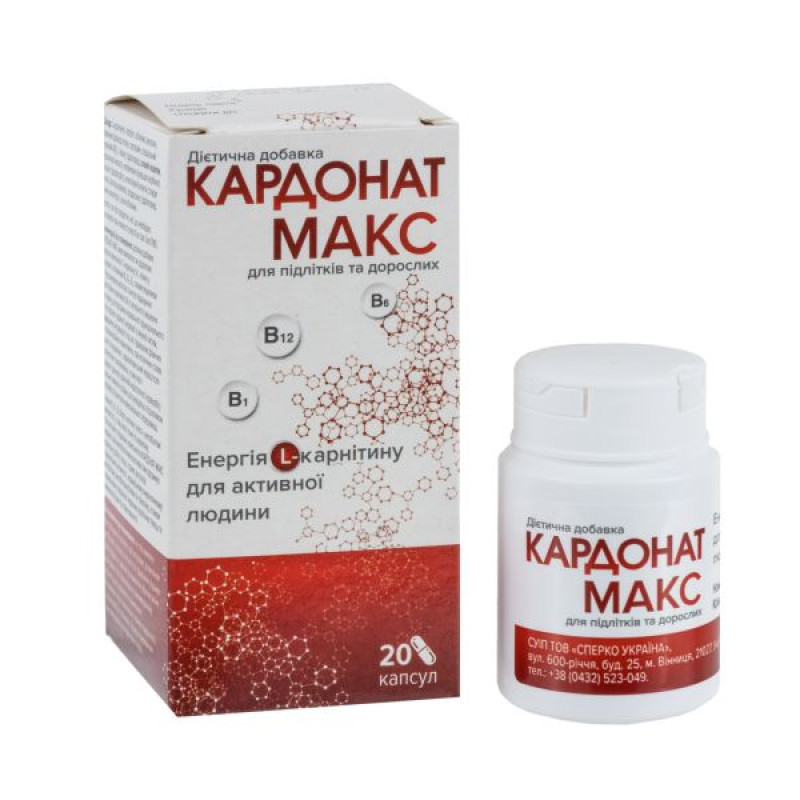Cardonat Max capsules No. 20

Instructions for Cardonat Max capsules No. 20
Composition
L-carnitine L-tartrate, shell (gelatin, dyes (titanium dioxide, tartrazine, special red AG)), L-lysine hydrochloride, soy lecithin, succinic acid, fillers (calcium carbonate, calcium hydrogen phosphate), anti-caking agents (magnesium stearate, silicon dioxide), pyridoxine hydrochloride, thiamine mononitrate, cyanocobalamin.
* contains soy or soy products, which must be taken into account if you have a soy allergy.
GMO-free.
The recommended daily serving contains:
| Active ingredients: | Contents in 2 capsules |
| L-carnitine | 250.0 mg (mg) |
| L-lysine | 150.0 mg (mg) |
| Soy lecithin | 60.0 mg (mg) |
| Succinic acid | 60.0 mg (mg) |
| Vitamin B6 | 5.4 mg (mg) |
| Vitamin B1 | 3.9 mg (mg) |
| Vitamin B12 | 9.0 micrograms (µg) |
Recommendations for use
Dietary supplement CARDONATE MAX can be used as an additional source of amino acids L-carnitine and L-lysine in combination with vitamins B1, B12, B6, soy lecithin and succinic acid to increase adaptive capabilities and general strengthening of the body, to maintain the normal functional state of the cardiovascular, nervous and immune systems, to increase endurance during increased physical and psycho-emotional stress, during the recovery period after diseases, including cardiovascular, chronic circulatory failure. It is advisable to use for people who are under the influence of harmful environmental factors.
Vitamins B1, B12, B6 take an active part in the metabolism of amino acids, including lysine and carnitine. The balanced combination of CARDONAT MAX components, due to its metabolic properties, supports normal heart function, contributes to the regulation of hormonal activity, normal energy metabolism, protein and glycogen metabolism, as well as normal red blood cell formation and the reduction of fatigue and tiredness.
General properties
L-carnitine (levocarnitine) is a vitamin-like substance that is naturally synthesized in the liver, kidneys and brain tissue from the amino acids lysine and methionine, and is found in the blood plasma in free form and in the form of esters. L-carnitine is the main cofactor in the metabolism of fatty acids in the heart, liver and skeletal muscles, and plays the role of the only carrier of long-chain fatty acids in the mitochondria, where their beta-oxidation occurs with the subsequent formation of ATP. Under normal oxygen supply, it shifts cell metabolism to the oxidation of fatty acids as the most energy-intensive substrate, and under hypoxia, L-carnitine removes toxic metabolites of fatty acids from the mitochondria, shifting cell metabolism to glucose oxidation, thus exhibiting antihypoxic and antitoxic properties. Levocarnitine and related substances can regulate immune circuits, and their effects on immune cell function are based on its dependent production of energy from fatty acids.
L-carnitine helps maintain normal energy metabolism in muscle cells, improves muscle recovery after exercise, helps maintain optimal development of motor functions. L-carnitine and its esters not only participate in the energy metabolism of heart muscle cells by transferring long-chain fatty acids from the cytoplasm to the mitochondria, but also exhibit other vital properties. They exhibit antioxidant and anti-inflammatory activity at various levels. It has been established that L-carnitine is a direct antioxidant and removes already formed oxygen radicals, and also inhibits the generation of radicals, promotes the removal of metabolites and toxic substances from the cytoplasm, improves metabolic processes, accelerates growth, causes an increase in muscle mass, contributes to the normalization of basal metabolism, reduces signs of physical and mental overstrain, exhibits neuro-, hepato- and cardioprotective properties, stimulates cellular immunity, and increases concentration.
Particular attention is paid to the ability of L-carnitine to act as an active factor affecting the transcription of genes that control cell survival under conditions of oxidative stress and inflammation.
Soy lecithin contains phosphatidylcholine – a phospholipid, which is the active ingredient of a dietary supplement. Phospholipids are of particular importance in the physiology of the nervous, hepatobiliary, and cardiovascular systems – they are the building blocks of all cell membranes. Under the influence of various factors (infections, hypoxia, hyperthermia, intoxication, etc.), the level of phospholipids decreases. Damage to the phospholipid component of cell membranes triggers the activation of phospholipases and lipid peroxidation, resulting in a cascade of biochemical abnormalities. One of the main mechanisms of action of phosphatidylcholine is the restoration of the structure of cell membranes of the liver, brain, and heart, which are approximately 75% (mitochondrial membranes – 92%) composed of phospholipids. Phospholipids support normal membrane fluidity and repair, exhibit antioxidant properties, protect mitochondrial and microsomal liver enzymes from damage, and contribute to its normal functioning. In addition, phosphatidylcholine contributes to the maintenance of normal cholesterol and lipid concentrations in the blood, and helps the heart function healthily.
Succinic acid is a normal intermediate metabolite and a component of the Krebs cycle. The transformation of succinic acid in the body is associated with the production of energy necessary to ensure vital activity. With an increase in the load on any of the body's systems, its operation is supported mainly by the oxidation of succinic acid. The power of the energy production system that uses succinic acid is hundreds of times greater than all other energy production systems of the body. This is what provides a wide range of non-specific health-promoting effects of succinic acid and its salts. In addition, succinic acid has such properties as angioprotective and antiviral. The basis of the health-promoting effect of succinic acid and its compounds is a modifying effect on the processes of tissue metabolism - cellular respiration, ion transport, protein synthesis, while the amplitude and direction of modifications depend on the initial functional state of the tissues, and its final result is expressed in the optimization of the parameters of their functioning.
Vitamin B1 also participates in numerous body functions, including: functioning of the nervous system and muscles, the entry of electrolytes into and out of nerve and muscle cells through ion channels; numerous enzymatic processes through the coenzyme thiamine pyrophosphate, carbohydrate metabolism, and the production of hydrochloric acid, which is necessary for normal digestion.
Vitamin B6 also helps regulate hormonal activity and is involved in protein and glycogen metabolism. Vitamin B6 cannot be synthesized in the human body, so it must be obtained from the diet, as its coenzyme derivative plays a vital role in the functioning of approximately 100 enzymes that catalyze important chemical reactions in the human body.
Vitamin B12 works in close partnership with other vitamins in the synthesis of components for the synthesis of DNA and RNA, as well as in the synthesis of molecules important for maintaining the integrity of the genome. It is also necessary for maintaining the integrity of the nervous system and for the synthesis of molecules involved in the biosynthesis of fatty acids and energy production.
Vitamins B1, B6 and B12 contribute to normal energy metabolism, heart function, nervous system and normal mental activity.
Vitamin B6 and vitamin B12 contribute to the normal functioning of the immune system, the reduction of fatigue and tiredness, and the formation of red blood cells.
Reservation
Do not use if you are hypersensitive to the ingredients, children under 12 years of age, or during pregnancy and breastfeeding.
This product does not replace a varied, balanced diet.
Do not exceed the recommended daily intake.
Do not use after the expiration date indicated on the package.
It is recommended to consult a doctor before consumption. It is not a medicine.
Method of administration and doses
Adults and children over 12 years of age, 1 capsule 2 times a day or as recommended by a doctor.
Duration of use: 4 weeks, further duration of use should be agreed with the doctor.
Storage conditions
Store in the original packaging at a temperature not exceeding 25 °C, out of the reach of children.
Expiration date
24 months.
Release form
Capsules weighing 516 mg. 20 capsules.
Producer
SUIP LLC "SPERKO UKRAINE", 600-richchia st., building 25, Vinnytsia, 21027, Ukraine.
There are no reviews for this product.
There are no reviews for this product, be the first to leave your review.
No questions about this product, be the first and ask your question.








